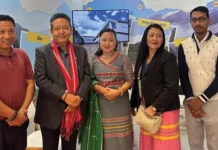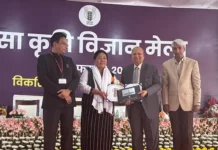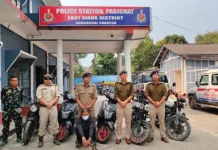NAMSAI, 19 Sep: Deputy Chief Minister Chowna Mein said that Arunachal Pradesh’ GST collections rose from Rs 227 crore in 2017-18 to around Rs 1,900 crore in 2023-24, reflecting over 700 percent growth in six years.
Similarly, the number of registered taxpayers grew from 7,365 in 2017 to 18,477 by mid-2025, showcasing the state’s efforts to expand digital access, simplify registration, and bring small businesses into the formal economy, Mein said.
“These additional resources have been instrumental in building roads, expanding healthcare, improving education, and funding welfare programmes. With the next-generation GST reforms, Arunachal Pradesh is now better placed to accelerate its development journey and contribute strongly to the vision of Viksit Bharat 2047,” Mein said, speaking at a programme on the GST reforms, organised by the Namsai district unit of the BJP here on Friday.
Mein underscored the transformative impact of the GST reforms, and also explained the major changes introduced by Prime Minister Narendra Modi and approved by the 56th GST Council, chaired by union Finance Minister Nirmala Sitharaman.
The reduced GST, to be effective from 22 September, aims to simplify the GST structure, reduce household expenses, and expand opportunities for farmers, artisans, youths, women entrepreneurs and small businesses, he said.
Describing the reforms as “people’s reforms,” the deputy chief minister said: “From cheaper daily essentials, medicines, and education-related items to affordable farm machinery, handicrafts, and tourism services, the simplified GST structure will benefit every section of society.
“For Arunachal Pradesh, these changes are especially significant, as they will empower farmers, artisans, small entrepreneurs, and women-led businesses, and create fresh avenues for self-employment and job generation,” he said.
The key GST reforms include simplified tax rates, cheaper household essentials and packaged foods, lower GST on farm equipment, handicrafts, and bamboo products, GST exemption for health insurance and lifesaving medicines, affordable education materials, accommodation, and wellness services, reduced GST on cement and vehicles, boosting construction and transport, easier compliance and stronger support for MSMEs and women entrepreneurs, Mein informed.
Earlier, Mein along with Namsai MLA Zingnu Namchoom and Nari-Koyu MLA Tojir Kadu participated in a Rashtriya Poshan Maah 2025 programme in Chongkham. (DCM’s PR Cell)




